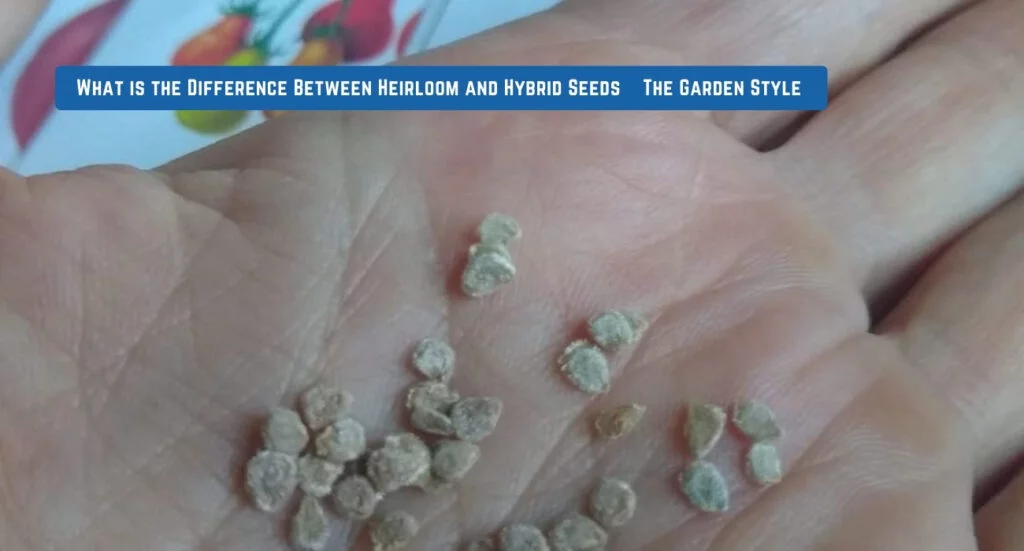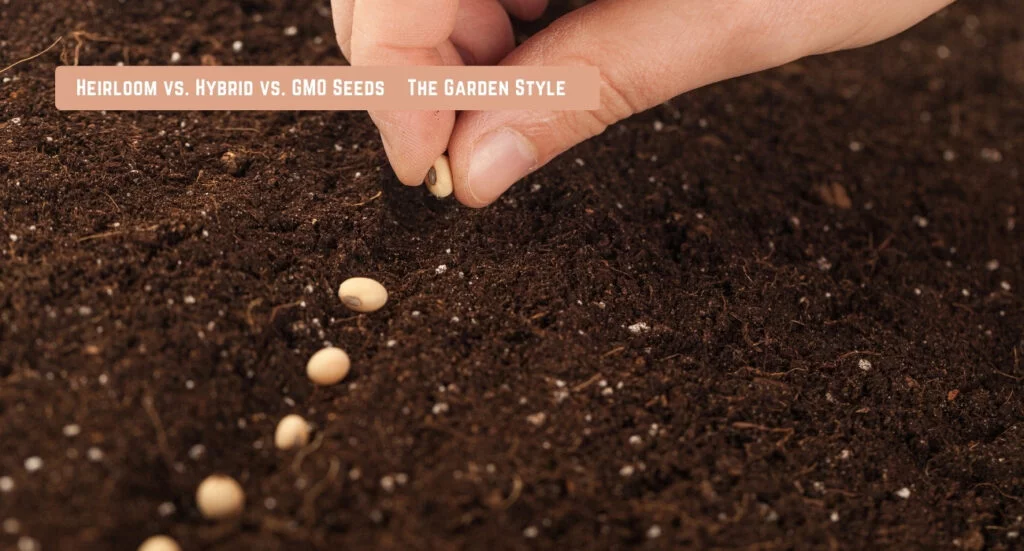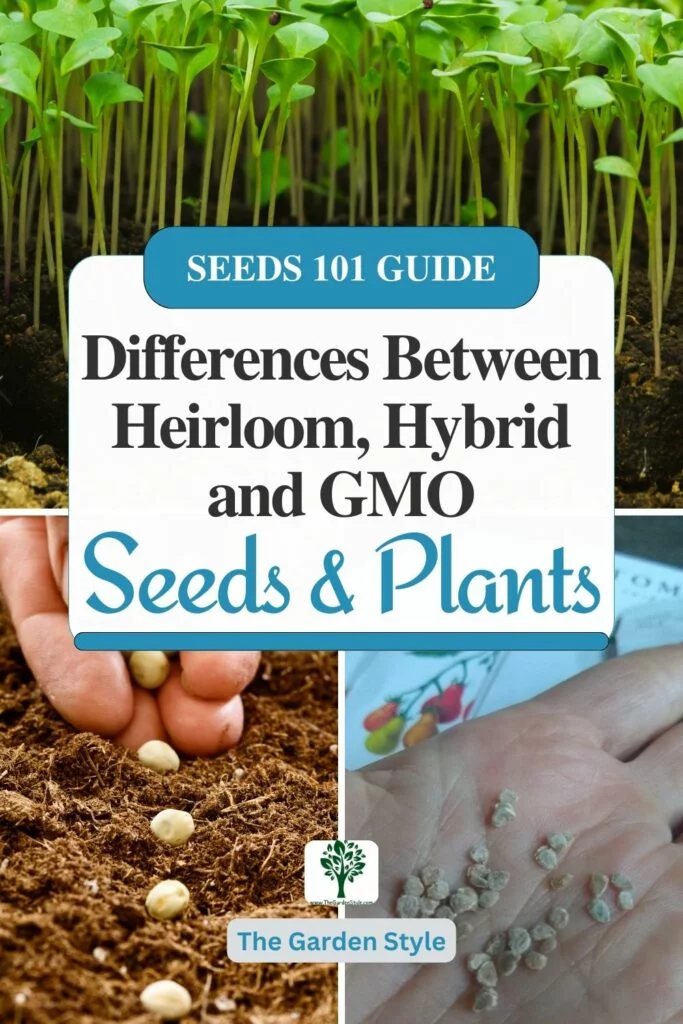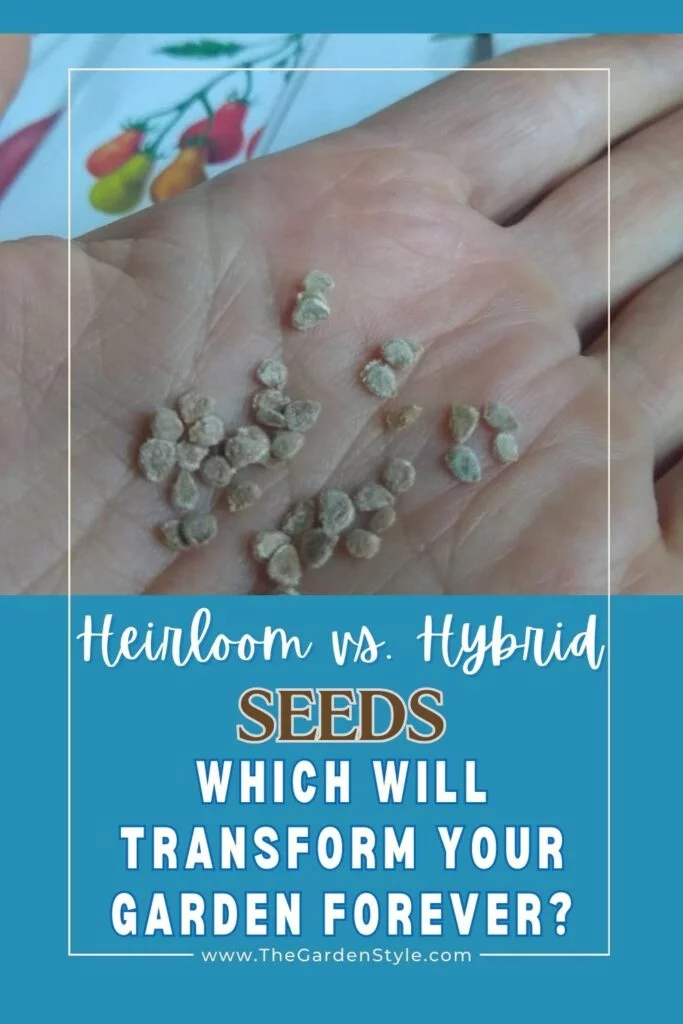When starting a vegetable garden for the first time, deciding what type of seeds to buy – heirlooms or hybrids – can seem overwhelming. Heirloom seeds preserve genetic diversity and historical traits, while hybrid seeds often offer improved yields, disease resistance, and uniform characteristics. However, understanding the core differences between these two options helps simplify your choice. This guide examines the unique advantages and disadvantages of heirloom and hybrid seeds, including how they vary in taste, yields, and disease/pest resistance. Our goal is to simplify the complexity for beginners, introducing you to the fascinating realm of heirlooms and hybrid seeds while also shedding light on the lesser-known aspect of genetically modified organisms (GMOs). We also provide tips for choosing seeds that are suitable for your garden.
Learn about choosing the right seeds and plants suitable for beginner-level gardeners. This guide explains the different types of seeds, such as heirlooms, hybrids, and GMOs. Let’s start.

Table of Contents
What are Heirloom Seeds
Heirloom seeds are more than just seeds; they’re living history. These are the seeds that have been passed down through generations, preserving the unique traits and flavors of the past. From vibrant tomatoes to aromatic herbs and flowers, heirlooms offer a connection to the roots of gardening. The diverse characteristics of heirloom plants contribute to the richness of your garden, making it a tapestry of flavors and stories.
Over 100 years of careful selection and seed preservation means heirlooms have an unrivaled depth of flavor and aroma qualities compared to modern hybrids or GMOs. Sometimes, their names reflect rich cultural or family histories. But heirloom seeds have some drawbacks to consider…
What are Hybrid Seeds
Hybrid seeds, on the other hand, are the result of a carefully orchestrated dance between different plant varieties. Hybrid seeds are produced by crossbreeding two distinct plant varieties, and this crossbreeding is not limited to heirloom plants. The goal is to combine specific traits from different parent plants, whether they are heirloom, modern, or other varieties, to create a new hybrid seed with desired characteristics.
It’s like matchmaking for plants, creating offspring with the best traits of each parent. This scientific approach leads to plants that are often hardier, more disease-resistant, and sometimes even faster-growing. Hybrid seeds offer a modern twist to gardening, providing a balance between tradition and innovation.
Heirloom Plants vs. Hybrids: Pros and Cons
Choosing heirloom seeds and plants comes with its own set of advantages and challenges. On the positive side, heirlooms offer unparalleled flavors, a wide array of plant varieties, and the joy of preserving agricultural diversity. However, they may require more attention, as some varieties can be more susceptible to pests or diseases. As a beginner, understanding these nuances is key to a successful gardening experience.
Hybrids, with their carefully crafted genetics, offer numerous benefits. Hybrid seeds bring together the best traits of different plants through controlled pollination. This scientific approach enhances qualities like disease resistance, yield, and adaptability. They often have increased yield, improved pest resistance, and better adaptability to diverse growing conditions. Imagine creating a dream team of plants that excel in various aspects. Hybrids provide a reliable option for beginners, offering a balance between traditional gardening and modern advancements.
On the flip side, they may not carry the same historical significance as heirlooms, and saving seeds from hybrids might not produce identical plants. Understanding these trade-offs empowers beginners to make informed choices for their gardens.
Difference Between Heirloom and Hybrid Seeds Chart
Here is a table summarizing the key differences between heirloom and hybrid seeds:
| Heirloom Seeds | Hybrid Seeds |
| Amazing taste and aroma | Enhanced disease/pest resistance |
| Adapt well to local growing conditions | Larger fruit size and yields |
| Seeds can be saved from year to year | Uniform fruit shape and ripening |
| Vulnerable to some pests and diseases | Poor flavor due to focus on yields |
| Lower yields than hybrid counterparts | Seeds cannot be replanted |

GMO Seeds: A Brief Overview for Clarity
Before delving deeper into heirlooms and hybrids, it’s essential to understand the concept of genetically modified organisms (GMOs). Unlike heirlooms and hybrids, GMOs involve direct manipulation of an organism’s genetic material in a laboratory.
Hybrid vs. GMO Seeds: Are Hybrid Seeds GMO?
I’m guessing that at this point, you are wondering, “Are Hybrid Seeds GMO?” No, not all hybrid seeds are GMO. The processes to get hybrid seeds and GMO seeds are entirely different. Therefore, you can find both hybrid and GMO seeds or hybrid and no-GMO seeds.
As I mentioned before, GMO stands for “genetically modified organism.” GMO seeds actually have DNA that has been artificially altered in a laboratory using genetic engineering, typically to make the plants resistant to herbicides or incorporate certain desired traits like improved yield. On the other hand, hybrid seeds are created by strategically cross-pollinating two parent plants from different but related plant varieties. Therefore, hybrid seeds don’t involve genetic engineering unless the purpose is to create hybrid seeds that are also GMO. Overall, you can say that not all hybrid seeds are GMO.
For the purpose of this article, our focus remains on the more natural processes of heirlooms and hybrids.
Heirloom vs. Hybrid Seeds: Which Will Transform Your Garden Forever?
As a beginner gardener, the plethora of seed choices can be overwhelming.
Some seeds may adapt better to specific climate conditions. Also, the selection should depend on your available space, so it is recommended to explore determinate seeds for container gardening or indeterminate seeds for in-ground growth. Keep in mind that vegetables grow with hybrid seeds, and their plants are often giants more than heirlooms. So, it depends on your personal preferences. You may start a garden with hybrid seeds and, the following season, pursue a new challenge by trying a few heirloom seeds.
My heirloom English lavender plants are the best. I used David’s Garden Seeds. The smell is so intense. However, regarding growing vegetables, I like trying different tomato seeds every year without overwintering my tomato plants. So, every year, I try different tomato seeds just for fun. And let me tell you that I have had beautiful experiences trying both types of seeds. Last year, I had good results growing San Marzano tomatoes from seeds using non-GMO heirloom seeds from Survival Garden Seeds. However, for bigger tomato varieties, I prefer growing hybrid Beefsteak tomato seeds.
- Classic Flavor – San Marzano tomato is famous as the base for a complex and flavorful tomato sauce. It is used extensively in Italian cuisine.
- Amazing Tomatoes – 5-6 oz tomatoes have meaty walls and small seed cavities. San Marzano plants are prolific.
- EASY GROW SEEDS: Healthy, indeterminate tomato vines produce all summer long, beginnign about 62 days after transplanting into the outdoor garden. Bred to thrive, these seeds produce healthy 48″ tall plants with a 36″ spread and a 5oz fruit harvest.
- NON-GMO: Each packet contains 50 non-GMO seeds. Burpee offers the highest quality, non-GMO seeds hand-picked by expert horticulturalists for growing in the home garden. Our germination rates are 35% higher than industry standards.
Are you drawn to the historical charm of heirlooms or the modern reliability of hybrids? There is no wrong choice here. Tailoring your seed choices to your specific needs sets the foundation for a thriving garden.
A Handy Table – Comparing Heirloom and Hybrid Seeds and Plants
| Aspect | Heirloom Seeds and Plants | Hybrid Seeds and Plants |
| Genetic Diversity | Preserves historical traits | Combines traits for specific benefits |
| Flavor | Rich and diverse | Consistent, sometimes bred for improved taste |
| Adaptability | May require more attention | Often more adaptable and resilient |
| Seed Saving | Can save seeds for next season | Seeds may not produce identical plants |
Frequently Asked Questions about Heirloom Seeds vs. Hybrid
Hybrid seeds result from crossbreeding two different plant varieties, often to achieve specific traits like disease resistance or higher yield. Heirloom seeds, on the other hand, are open-pollinated and passed down through generations, maintaining their original characteristics. Unlike hybrids, heirloom seeds can reproduce true to type, meaning their offspring will closely resemble the parent plant.
When we say that a hybrid seed results from crossbreeding two different plant varieties, it means that plant breeders intentionally mate two distinct parent plants with desirable traits to create a new hybrid variety. The goal is to combine specific characteristics from each parent, such as disease resistance, high yield, or other desirable qualities. This controlled crossbreeding process involves transferring pollen from one plant to the flower of another, resulting in a hybrid seed with a combination of traits from both parent plants.
Yes, all heirloom seeds are organic if they were grown organically. It’s somewhat redundant to say “heirloom seeds that are organic” because heirloom seeds typically imply traditional, non-synthetic farming methods, often associated with organic practices. However, it’s essential to note that not all heirloom seeds are necessarily grown organically, as cultivation methods can vary. If you want to emphasize the organic aspect, it’s still a good practice to explicitly mention it, but the term “heirloom” already implies a connection to traditional and non-GMO farming practices.
No, heirloom seeds are not hybrids. Heirloom seeds are open-pollinated varieties that have been passed down through generations, maintaining their original traits. Unlike hybrids, heirloom plants can produce offspring that closely resemble the parent plant when they are allowed to pollinate freely.
Heirlooms offer an explosion of diverse flavors that hybrids simply can’t match. Heirlooms impart sweet, tangy, earthy flavors into dishes rather than tasting flat or watery.
While you can save seeds from hybrid plants, they may not produce identical plants. It’s not recommended. Hybrid plant seeds do not breed true – their offspring in the next generation will revert back to the traits of the original parent plants, losing hybrid vigor.
Hybrids are generally easier for beginning gardeners since they are bred to resist common garden diseases. However, adapted heirlooms that thrive locally can be just as easy (or even easier) to grow than hybrid imports once your skill level improves.
Consider climate conditions in your area, plant varieties suitable for your available space (containers, raised beds, or in-ground), and your personal preferences (GMO vs. no-GMO, taste vs. difficulty level, etc). Both heirlooms and hybrids offer unique advantages; choose based on what aligns with your gardening goals.
Without question, hybrid varieties yield significantly higher quantities of vegetables than heirlooms. Gardeners report doubling, tripling, or even quadrupling yields, switching from heirlooms to hybrids.
It’s like comparing a delicious home-cooked meal to fast food! Heirlooms have complex flavors with the perfect balance of sweet and tangy, while grocery store produce tends to taste bland and watery by comparison.
Some heirloom varieties may be more susceptible, but proper care and gardening practices can help minimize these challenges.
GMOs involve laboratory manipulation, and for this guide, we focus on the more natural processes of heirlooms and hybrids commonly used in traditional gardening.
Absolutely! Mixing heirlooms and hybrids can provide a diverse and balanced garden. Just be mindful of each plant’s specific needs for optimal growth.
The seeds called “determinate seeds” produce plants with a fixed size that set fruit and decline. Suitable for limited spaces. On the other hand, indeterminate seeds yield plants that keep growing and producing fruit throughout the season. Often vining and may require support.
It is very common to see the terms “determinate or indeterminate” when looking to buy tomato seeds heirloom or hybrid. However, the terms determinate and indeterminate are not directly related to whether a seed is heirloom or hybrid. Determinate and indeterminate refer specifically to the growth habits of tomato plants. Heirlooms and hybrids describe the genetic characteristics of the seeds and how they were produced.
Conclusion
Embarking on your gardening journey is an exciting endeavor filled with choices and discoveries. Whether you opt for the rich history of heirlooms or the scientific prowess of hybrids, each seed you plant contributes to the unique story of your garden. As a beginner, understanding the differences between heirloom and hybrid seeds equips you with the knowledge to nurture a flourishing green haven.
Pin it for later!




